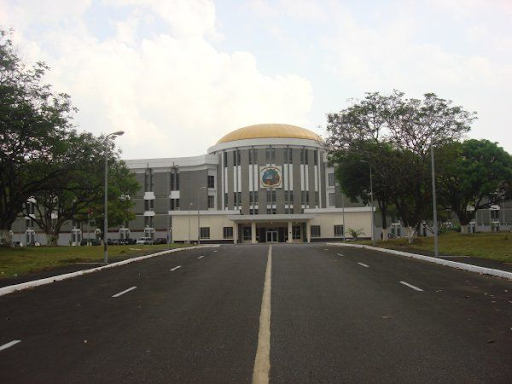Liberia: Senate Postponing Census?

The Capitol building, Liberia.
— If the House of Representatives concurs with the Senate, it will be the sixth deferment since the exercise was initially scheduled to take place in January 2018.
The plenary of the Senate has voted to postpone the conduct of the census from October 2022 to March 2023, in violation of the Constitution, which mandates in Article 39: “The Legislature shall cause a census of the Republic to be undertaken every ten years.”
This round of census, which had been postponed, should have been held in 2018. However, since then, it has been delayed for one reason or another. Since the last population Census in 2008, Liberia has not had another Census. The 2018 census was delayed to March 2022, due to the outbreak of the COVID-19 pandemic.
Before the coronavirus, the census was regularly postponed on grounds that LISGIS was having financial issues and, as such, it needed more time. Now, the Senate’s postponement will make it the 6th deferment since the exercise was initially scheduled to take place in January 2018.
The first four modern censuses were held in 1962, 1974, 1984, and 2008 and revealed how the population had increased differently beginning at 1.1 million, 1.5, 2.1, and 3.5 million, respectively.
However, the decision taken by the Senate yesterday, after a lengthy debate based on a report from its Committee on Autonomous Agencies and Commissions, has not gone well with the Liberia Statistics for Geo-Information Services (LISGIS). But the Senate Committee on Autonomous Agencies and Commissions said it was LISGIS who had earlier proposed the change of year in a meeting with the committee.
The Committee chaired by Bong County Senator Henrique Tokpa then recommended the Senate approve on the said proposed date, but members of the Senate rejected such proposal and settled for March 2023. But the proposal was rejected by the Senate out of concerns that the road conditions in several counties in October are deplorable; as such, it would hamper the movement of not only LISGIS workers but citizens of many parts of the country.
The Senate’s decision to postpone Liberia’s 5th census was proffered through a motion by Montserrado County Senator, Abraham Darius Dillon, who had argued that if the census were to be held in October, the result would have no significant impact on next year's Legislative and Presidential Elections. Therefore, March would be the most suitable date.
His argument was backed by other Senators, including those from River Cess and River Gee Counties, Jonathan Boye-Charles Sogbie, and Wellington Geevon-Smith, on grounds that the census be postponed to March 2023 to avoid the rainy season and bad roads in most counties.
However, a motion for reconsideration was filed by Grand Kru County Senator, Numene Bartekwa, and supported by Senators Nyonblee Karnga-Lawrence and Botoe Kanneh of Grand Bassa and Gbarpolu Counties, respectively.
Sen. Bartekwa later declined to proceed with the motion for reconsideration and, instead, joined his colleagues to dash the hopes of the minority who argued against the postponement. The President Pro Tempore of the Senate, Albert Chie, has meanwhile informed the Senate that the motion for reconsideration will be placed on the floor to be tested shortly, and it requires a two-thirds majority of Senators to overturn Sen. Dillon’s motion.
If the House of Representatives concurs with the Senate, through a joint resolution, the postponement of the October 2022 census will be the sixth deferment since the exercise was initially scheduled to take place in January 2018.
Meanwhile, sources at LISGIS have refuted the Senate Committee on Autonomous claims that they proposed the change of the year.
The sources added that the census postponement from 2022 to 2023 will be a disregard to the United Nations Statistics Division (UNSD), which is responsible to monitor and regularly report to the Statistical Commission on the implementation of the 2020 World Programme, having set the deadline to 2022.
The source said Liberia and 157 other countries have committed to conduct censuses, as United Nations Member States at the midway point of the 2020 census round. And it may cost the country dearly because relevant data on the country will not be available for the UN to include Liberia in the Sustainable Development Goals (SDGs) aimed at ending all forms of hunger and malnutrition by 2030, making sure all people — especially children — have sufficient and nutritious food.
The source added that the national sample frame, which is the key to all surveys including ad hoc, will be ready at the end of the month. Therefore, the census should be held in October. The source indicated that the Household Income Survey, the Agriculture Survey, and other surveys are behind schedule due to the previous extensions of the Census.
Also, the borrowed 21,000 tablets and power banks have to be returned to Ghana by November of this year and would cost over US$5 million to purchase by the Government, coupled with the time [wasted]. Further, the shift from October 2022 to March 2023 would clearly lead to donor fatigue and could cost an additional US$8 million to US$10 million if it were to move to March of next year, the source said.
“All of the steps leading to the main enumeration for the October Census are well on course, given the approved Gantt Chart.
“Both LISGIS Management and the international partners have agreed to conduct the Census in October based on the approval given by the Steering Committee.”
The sources noted: “The draft proclamation letter is being sent to the Foreign Ministry for the October Census.” However, sources from the Capitol said the House of Representatives will upset the Senate’s decision, likely resulting in a conference committee.
“If we don't have the census in 2022, it means we will have the census in 2025 or 2026 because we can’t have a census in an election year and we can’t have a census the first year of a newly seated government,” the source said.
